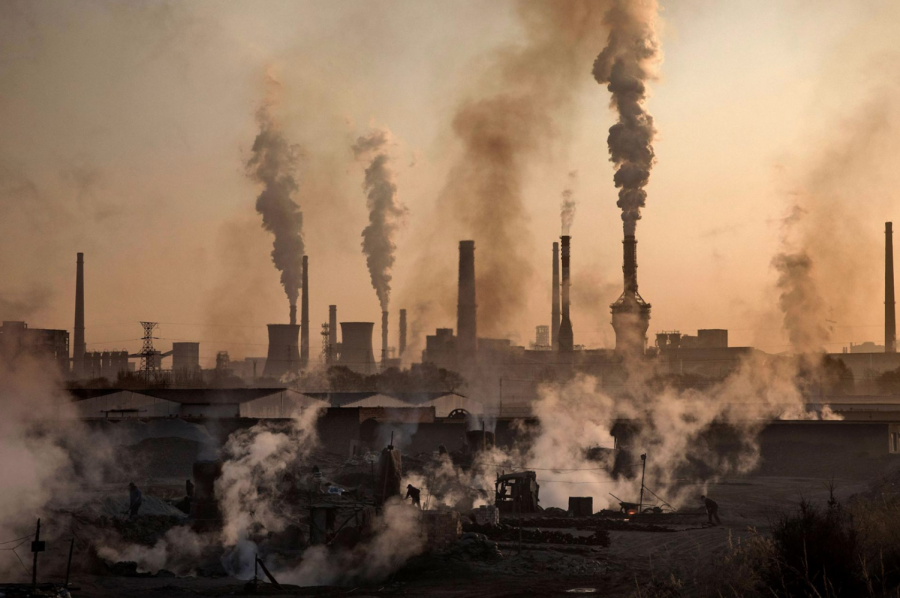Don’t Let Our Future Go Up In Smoke
Air Pollution
Photo Courtesy of Kevin Frayer, Getty Images
Factories are releasing toxic air pollution into the air.
May 28, 2019
Widespread industrialization and pollution have given way to a familiar yet dangerous problem: air pollution. All around the world, more and more of the effects of the pollutants clouding our atmosphere are being discovered. Recent studies have given way to alarming headlines that warn of the potential for dementia, of asthma, heart problems, and a plethora of other health problems. Not only that, but even plants and animals are suffering from hazardous air pollution that humanity continues to create.
Air pollution can actually describe a number of different pollutants, the two most common types being smog and soot. Whereas smog “occurs when emissions from combusting fossil fuels react with sunlight,” soot is composed of “tiny particles of chemicals, soil, smoke, dust, or allergens, in the form of gas or solids, that are carried in the air” (Natural Resources Defense Council). John Walke, the director of the Clean Air Project, explains that “both come from cars and trucks, factories, power plants, incinerators, engines,” and more.
The effects of air pollution are widespread and serious. Caleb Finch, a gerontologist and the leader of USC’s Air Pollution and Brain Disease research network, believes that “air pollution is just as bad as cigarette smoke.” He adds that he has “no hesitation whatsoever to say that [it] causes dementia.” He supports his claims through an experiment that took place in 2018; the experiment discovered that among 130,000 older adults in London, people exposed to more air pollution were increasingly more likely to develop Alzheimer’s disease. Overall, the study found that the group of adults was 1.5 times more likely to have Alzheimer’s.
However, Alzheimer’s is far from being the only health risk that air pollution poses. A new study by USC, published in The American Journal of Clinical Nutrition, found that “exposure to traffic pollution during childhood makes adolescents 34 percent more likely to eat foods high in unhealthy trans fats — regardless of household income, parent education level or proximity to fast-food restaurants.” This presents an alarming correlation between air pollution and child obesity, the latter of which has already become a serious health concern for children across the planet.
Another new study–led by Diana Younan, a preventive medicine research associate at USC–found a correlation between air pollution and teenage delinquency. In particular, they targeted “tiny pollution particles called particulate matter 2.5 (PM2.5)” and how the particles “damage brain structure and neural networks” and “influence adolescent behaviors.” Not only the physical but also mental damage that air pollution can cause people of all ages showcases just how critical it is to take action against it.
Unfortunately, recent administration–particularly in the United States–has been actively working against the regulations that would decrease air pollution. In fact, the Environmental Protection Agency has decided to “use a different method to estimate the ‘future health risks of air pollution.’” The agency’s new Affordable Clean Energy rule “would roll back Obama-era regulations on coal-fueled power plants” and “allow states to set their own emissions standards for carbon dioxide from power plants, instead of imposing a national standard” (The New York Times). Thus, this new law–along with previous actions–seems to be ignoring the undeniable evidence that air pollution has seriously negative effects on human health.
Priscilla Kim (11) agrees that air pollution is “detrimental to all of us” and that “we need to try harder to reduce it.”
From dementia to obesity to juvenile delinquency, recent findings are drops of evidence into the wider pool of health risks air pollution poses. It is about time that both people and governments all around the world begin to address the issue before it is too late.





































